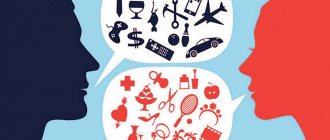Have there ever been situations in your life when it seemed like the whole world was against you? When does a bad mood become a constant companion, and the usual joys are replaced by apathy towards everything? Or maybe there are people around you who can make mountains out of molehills and fall into sadness for any reason?
Some people are completely unfamiliar with such prolonged periods of sadness and melancholy, while others live in constant proximity to depression.
Is it possible to distinguish depression from temporary sadness? Why is it so important to do this on time? What are the consequences of depressive disorder? And is it possible to protect yourself from such episodes?
Let's figure it out.
Why does a black streak happen and how to deal with it?
Recently, search queries on the Internet increasingly contain phrases like: “What to do if you feel bad?”, “How to cope with depression?”, “What to do to end the black streak?”
The modern generation is increasingly faced with anxiety, stress, depression and other disorders. This is caused by a large number of factors, from the cognitive characteristics of a particular person to the values broadcast by the media.
Someone may approach problems philosophically, believing that they are part of life and are an excellent opportunity for a person to become better and stronger. However, not all people are able to understand what exactly they did wrong, that all the troubles of the world suddenly fell on them [Success, 2017].
It's important to understand that sometimes terrible things happen to really good people. Of course, if a person acts badly, there is a good chance that terrible things will happen to him, not for lack of luck or karma, but because many around him will probably want to retaliate.
On the other hand, it is possible to live a decent life, treating everyone with respect, kindness and love, but still live a life of unimaginable pain and suffering.
Every person should know what to do if he feels bad. When something unpleasant happens to him, he has the right to be angry, offended, sad, afraid and experience a different range of emotions. He has the right to feel offended and to believe that everything that happens to him is completely unfair.
But sometimes people tend to exaggerate the scale of the tragedy and see problems where there really are none. This may be due to the characteristics of perception, the character of a particular person, his upbringing and way of thinking.
Surely each of you is familiar with people who create a tragedy over an absolute trifle, to which a person with healthy self-esteem and an adequate perception of reality would not pay attention.
People who want to attract attention are especially prone to excessive dramatization of events. They are unable to openly talk about their feelings and emotions and often resort to the role of the victim, preferring to complain about the injustice of the world towards them.
Unfortunately, others cannot always understand whether a person is really experiencing a state of sadness or depression or is once again manipulating his position in order to attract attention to himself.
But if you do not provide timely support to such a person and leave him alone with all the difficulties and experiences, the situation can worsen to a depressive disorder.
I feel bad. main reason
Don't neglect God's help. When your strength is running low, remember the One who created you. God is love. He can and wants to help you; you were not created to suffer, but to fulfill a special purpose on Earth. You are unique, and there is no other person like you on the planet and there never will be. The Bible says we are created in the image and likeness of God. The devil hates God, but is not able to harm Him. Therefore, Satan takes revenge on the Creator by attacking His image – us, people.
Make peace with God, ask Him for protection!
Live communication with God
Share link:
What is depression?
Depression (depressive disorder) is a common and serious illness that negatively affects how a person feels, what thoughts they have, and what actions they take. Typically, depression causes feelings of sadness and loss of interest in activities that once brought joy. It can lead to a variety of emotional and physical problems and significantly reduce a person's ability to function effectively at work and at home [American Psychiatric Association, 2020].
Symptoms of depression can range from mild to severe and include:
- sadness or depressed mood;
- apathy;
- changes in appetite (weight loss or gain);
- sleep problems (insomnia or excessive sleepiness);
- loss of energy or increased fatigue;
- decreased physical activity;
- irritability;
- a constant feeling of worthlessness or unreasonable guilt;
- difficulty thinking;
- loss of concentration;
- difficulties in making decisions;
- thoughts of death or suicide.
If any of the symptoms are constantly present for at least two weeks and are not a characteristic feature of a person, you should sound the alarm.
According to research, depression affects approximately one in 15 adults each year, and one in six people in the world will experience this disorder at some point [American Psychiatric Association, 2020].
Depression can affect anyone - even people living in ideal conditions. There are a number of factors influencing the occurrence of this disorder:
- Biochemistry . Differences in certain brain chemistry may contribute to symptoms of depression. The risk of its occurrence is higher if the frontal lobe of the brain is less active. However, scientists have not yet determined whether this activity disappears before or after the onset of depressive symptoms.
- Genetics . Depression can run in families. If someone in a person's family (parents, grandparents, brothers and sisters) suffers or has suffered from depression, there is a high degree of manifestation of this disorder in that person [American Psychiatric Association, 2020].
- Personality . People with low self-esteem, who have difficulty coping with stress and who are generally pessimistic are more prone to depression than optimists.
- Environmental factors . Being under constant stress, the threat of violence, neglect, abuse, or poverty can make some people more vulnerable to depression.
- Psychological trauma . Often, traumatic events that occurred in early childhood or adolescence can leave an imprint on the further formation of personality and the tendency for it to develop depressive disorders.
- General condition of the body . Certain conditions may put a person at higher risk, such as chronic illness, insomnia, physical pain, or attention deficit hyperactivity disorder (ADHD).
- Bad habits . Abusing drugs or alcohol can affect your mood and significantly increases your risk of developing a depressive disorder. About 21% of people who use psychoactive substances are susceptible to depression [American Psychiatric Association, 2020].
Depression can occur at any time, but on average first appears before the age of 25. According to psychologists, women are more prone to developing depressive disorder than men. Some studies show that one third of women experience a major depressive episode at least once in their lives [American Psychiatric Association, 2020].
Don't neglect your future
Many people mistakenly believe that during a difficult life situation, drinking alcohol will ease the soul... Is this really so? The first hour or two, indeed, may make you feel better, since your logic will weaken and your soul will be open to plowing. The nerve endings will be muted, and then what? Afterwards, such a wave of emotions will come that will engulf the person and cause severe depression. Alcohol and drugs will not help improve the situation, and temporarily suppressing it can lead to consequences that will make an already not the best life many times worse. If you are not prone to alcoholism. You can allow yourself to call your loved ones, sit down like a human being at a common table, with a small amount of alcohol and have a heart-to-heart talk, open up to people in whom you are confident. Thus, drinking alcohol in the current situation can still play the role of a mental balm.
Persistent depressive disorder
A person with persistent depressive disorder (formerly called dysthymic disorder) has a depressed mood most of the day, some days at a time, for at least two years. In children and adolescents, mood may be irritable or depressed and may persist for at least one year.
Persistent depressive disorder often begins in childhood, adolescence, or early adulthood and affects approximately 0.5% of adults in the United States each year. People with persistent depressive disorder often describe their mood as sad or depressed. Because these symptoms have become part of a person's daily experience, they may not seek help, simply assuming that they have always been this way [Healthline, 2020].
Symptoms cause significant stress or difficulty in work, social activities, or other important areas of functioning. Although the impact of persistent depressive disorder on work, relationships, and daily life can vary widely, its effects can be as significant as or greater than those of major depressive disorder.
Depression is classified as a mood disorder. It can be described as a feeling of sadness, loss, or anger that interferes with a person's daily activities.
The Centers for Disease Control and Prevention (CDC) estimates that 8.1% of American adults aged 20 years and older experienced depression in any two-week period from 2013 to 2021 [Centers for Disease Control and Prevention, 2018].
People experience bad moods in different ways. If for one it is a reason for a little blues and further motivation for action, then for another such an episode can lead to problems in personal relationships, at work and loss of interest in life in general [Healthline, 2020].
Depression negatively affects the entire human body, not only worsening its condition, but also exacerbating existing diseases. Here is just a small list of conditions that can get worse due to depression:
- arthritis;
- asthma;
- cardiovascular diseases;
- oncological diseases;
- diabetes.
It is important to understand that temporary depression is a normal part of life. Sad things happen to everyone. But if you regularly feel depressed or lost, you may be dealing with depression [Healthline, 2020].
Depression is considered a serious illness that can get worse without proper treatment. Those who seek treatment often see improvement in symptoms in just a few weeks.
Let it go











